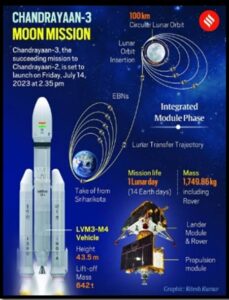CHANDRAYAAN-3’S PROPULSION MODULE: A STRATEGIC RETURN TO EARTH ORBIT
Why in the News?
- The Chandrayaan-3 Propulsion Module (PM), which initially ventured to lunar orbit, surprises scientists by retracing its steps back to Earth orbit.
- This unexpected move showcases the logistical advantages of the mission, particularly the fuel reserves.
- Impromptu Manoeuvre:Similar to the spontaneous ‘hop’ experiment, where the lander executed a brief engine firing, the PM’s return exploits available fuel efficiently.
Chandrayaan-3’s Unique Features
Mission Design:
- Chandrayaan-3 differs from its predecessor, featuring a lightweight Propulsion Module instead of a full-fledged orbiter.
- Communication with Earth is facilitated by utilizing the Chandrayaan-2 orbiter, still operational in lunar orbit.
Scientific Payload:
- The PM carries the Spectro Polarimetry of Habitable Planet Earth (SHAPE) instrument, designed to study Earth’s habitability signatures and identify habitable exoplanets.
- SHAPE’s mission life was initially planned for three months.
Source: Indian Express
Positive Outcomes/ Learning Opportunities
- Software Development Opportunity: The unexpected manoeuvre serves as a demonstration for future lunar sample return missions and aids ISRO in software development for trajectory planning.
- Understanding Small Spacecraft Navigation:
- The experiment helps ISRO comprehend the intricacies of planning and executing trajectories and manoeuvres for small spacecraft returning from the Moon to Earth.
- It paves the way for developing software modules to plan and execute gravity-assisted flybys across celestial bodies and ensures the controlled end-of-life for the PM.
Current Orbit Status:
- As of now, the PM orbits Earth with an orbit period of nearly 13 days and 27 degrees inclination.
- Varied perigee and apogee altitudes pose no threats to operational Earth-orbiting satellites.
Chandrayaan-3’s unexpected manoeuvre not only showcases India’s space prowess but also provides invaluable insights for future lunar and space exploration endeavours.

 Source: Indian Express
Source: Indian Express

